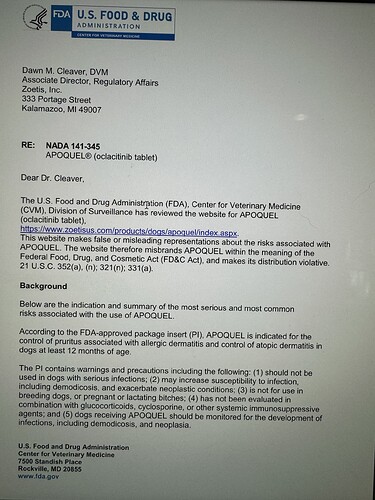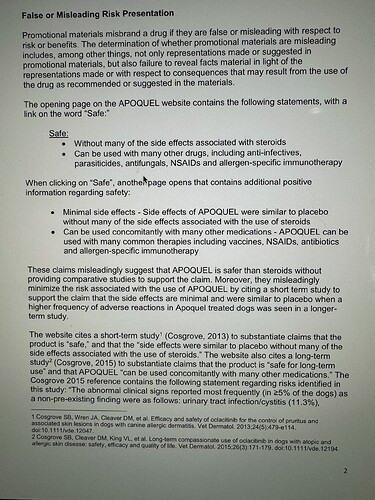Apoquel and Cytopoint are hard no for me – I will do my best to get any client off of them!
Shared from Dog’s First: Conor Brady
DOES APOQUEL AGGRAVATE CANCERS? THE WEBSITE SAYS SO…
Here’s the low down - our T cells are a vital component of our immune system. They attack pathogens and constantly scrutinize and destroy tumour cells.
Very handy, we’re all agreed.
Apoquel, for inflamed dogs, works by reducing their T-cell response.
And it does work to relieve itch, no doubt. The problem we this side of the fence (folk with questions) have is that, aside product safety, what is the CAUSE of that itch. As conventional vets never seem to realise it’s usually kibble / gut / gut flora / yeast related, the worry is that this powerful drug becomes a FIRST response as opposed to a last.
Because there are obviously side effects to immune suppression.
By decreasing your pets system’s ability to neutralise cancer, many vets, specifically dermatologists, are concerned by the increasing levels of cancers they have observed in animals on the drug, that Apoquel (and drugs like it) may be fuelling this cancer growth (just may not necessarily INITIATE it).
Side effects listed on the product insert include “vomiting, diarrhoea, lethargy, anorexia, dermal masses (unspecified), decreased leukocytes, decreased globulins, and increased cholesterol and lipase. Low numbers of dogs in the studies developed demodicosis, NEOPLASIA, pneumonia, bloody diarrhoea, skin and ear infections, UTIs, and histiocytomas”.
In fact, the Apoquel website states
“Apoquel may increase the chances of developing serious infections, and may cause existing parasitic skin infestations or pre-existing cancers to get worse.”
So what do you know about Apoquel and its cousin, Cytopoint, the cruxes of the atopic response by the conventional veterinary sector?
About as much as me I bet. So we’ll be scheduling a show on them soon. As ever, any dirt you have, you know where to find me. In the meantime, I went looking for some. Every single vet website that discusses the drug mentions the fact there is a study showing it DOES NOT cause cancer.
This study was produced by Zoetis, the charming multi-billion manufacturer of said medication.
So rest assured!!
That’s Zoetis, with 1.4/5 stars on TrustPilot.
That’s Zoetis, manufacturers of other drugs like Librela which are currently under investigation for (potentially) causing more harm than good, fuelled by a 2024 article in the Wall Street Journal article titled “What Killed Their Pets? Owners Blame Meds, but Vets Aren’t Sure". The article states “Health regulators in the U.S. and Europe have received thousands of reports of side effects and are currently conducting reviews”.
That’s Zoetis, currently under investigation by EU antitrust regulators as it (may have) blocked the market launch of a rival pain medicine for dogs, a move that could result in a hefty fine for the U.S. pet products maker.
Sure why wouldn’t you trust a little study they produce that supports their main cash cow.
The fact that study is enough for the entire veterinary profession to turn off their radars and keep on recommending this drug, sort of tells you where we are.

